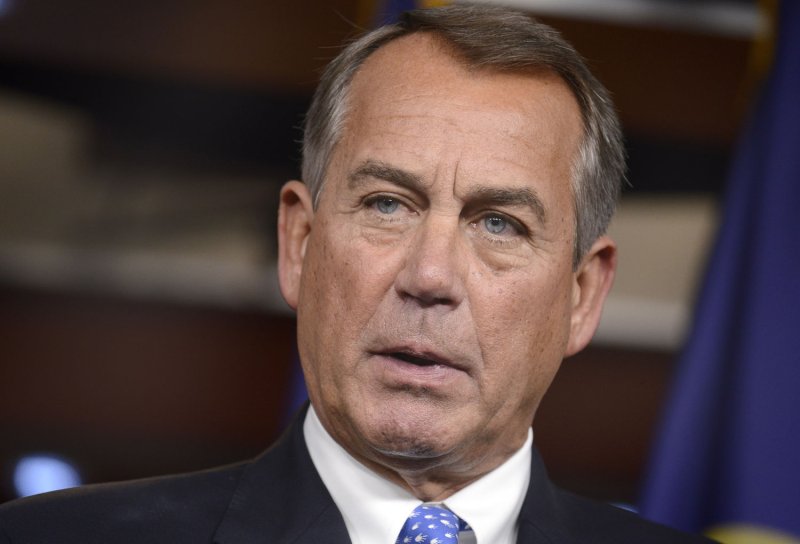House Speaker John Boehner shot down the latest proposal for reinstating benefits for the long-term unemployed as unworkable. File photo. UPI/Mike Theiler |
License Photo
No job, no money and no prospects for the situation to change any time soon: That's what's facing the more than 2 million long-term unemployed Americans whose extended benefits began expiring just after Christmas.
Ten days ago, a bipartisan group of senators announced they had reached a compromise agreement that could reinstate benefits for those who have been out of work for more than 27 weeks. But last week, House Speaker John Boehner, R-Ohio, pronounced the agreement unworkable and the National Association of State Workforce Agencies said even if the measure were adopted, it could take until June before recipients would see any relief.
"It is extremely disappointing that, no matter what solution is reached, there is some excuse to deny these much-needed benefits," Sen. Dean Heller, R-Nev., one of the architects of the compromise, said in a statement.
The Department of Labor estimates there are currently 3.8 million long-term unemployed, making up 37 percent of all those out of work.
Maurice Emsellem, program director for access and opportunity for the National Employment Law Project, said in an interview with UPI the expiration of extended benefits has been devastating for workers and their families with severe long-term consequences.
"These are people who have been unemployed for six months, many longer. They're stretched financially. Now they have zero income. That's devastating," Emsellem said, adding the situation will have an impact on whether the children of the long-term unemployed will succeed in school and move on to find jobs themselves.
Additionally, the lack of benefits makes it impossible "to put gas in the tank. They can't pay the Internet bill to apply for jobs online. ... It makes it really difficult to look for work," Emsellem said.
Heller and Jack Reed, D-R.I., announced March 13 a bipartisan bill that includes offsets had been worked out, providing benefits retroactive to Dec. 28.
"Restoring this much needed economic lifeline will help job seekers, boost our economy, and provide a little certainty to families, businesses, and the markets that Congress is capable of coming together to do the right thing," Reed said.
The bill could come up for a vote as early as this week.
But should it pass the Senate, Boehner said Wednesday the House won't even consider it. He said Democrats need to come up with a measure "that is fiscally responsible, and gets to the root of the problem by helping to create more private-sector jobs.
"There is no evidence that the bill being rammed through the Senate by Leader [Harry] Reid meets that test, and ... the bill is also simply unworkable," Boehner said in a blog posting.
Boehner hung his objection on the statement issued earlier in the day by NASWA, which pointed out there are bureaucratic impediments to implementing the measure, which also imposes more administrative burdens on the states.
The group said in a letter to Reid many states have antiquated computer systems that cannot be reprogrammed within the bill's time frame. It also objected to a lack of compensation for the increased administrative burden and called the exclusion of those who had $1 million salaries unworkable. It also said making the benefits retroactive to Dec. 29 would make applying states' weekly job search requirements nearly impossible.
"While no one thought this would be an easy or seamless process for the state unemployment insurance agencies, the agencies retroactively restored benefits after a significant lapse in 2010, so we know that they can do it," NELP Executive Director Christine Owens said.
"Using these relatively minor concerns to continue to justify leaving more than 2 million people out in the cold further illustrates that unemployed Americans are invisible to House Republicans," Drew Hammill, a spokesman for House Minority Leader Nancy Pelosi, D-Calif., told the Hill.
Emsellem, however, still is optimistic.
"There's a real deal on the table," he said. "If it passes the Senate, it's going to be a whole other ballgame. ... It's a different analysis when a bipartisan bill passes. That's a lot tougher situation for Boehner and the [House] Republicans [to ignore]."















